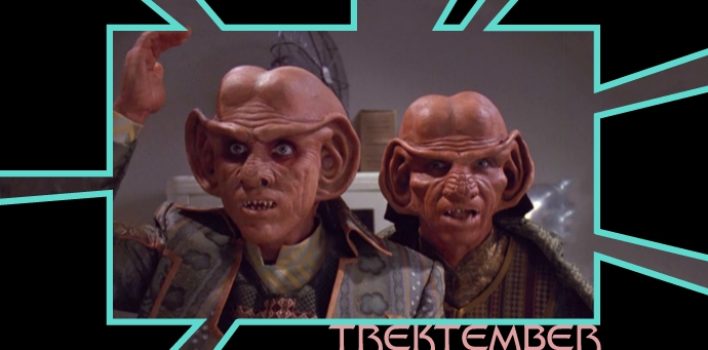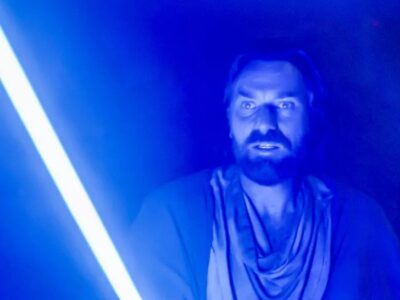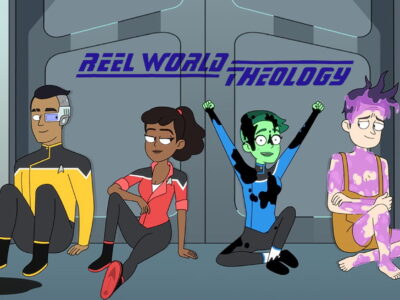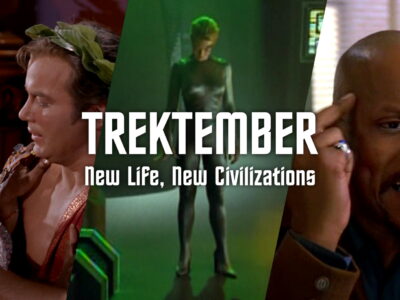Trektember: Little Green Men
I’m a little tired of seeing first contact stories told from the humans’ perspective. Don’t get me wrong; I don’t hold it against anyone. Every author I’ve ever heard a story by has been from Earth, after all (at least as far as I know). They write what they know, and they know humanity.
I also don’t hold it against anyone for writing first contact stories. They’re popular; and done well, they’re some of the best stories we’ve told: Contact, Independence Day, E.T., Arrival. The Star Trek franchise even did two different shows called “First Contact” using the same characters, though admittedly in putting it in their intro narration (“to seek out new life and new civilizations…”), they did kind of paint themselves into that particular corner. They’re stories of wonder, of import, of a world changed overnight (or of a world that should be).
But most of the angles for examining first contact from humanity’s perspective have been played out. Sometimes we’re the race being contacted, sometimes we’re the race making contact, but the camera is always on us. Maybe that’s why I like “Little Green Men;” not because it’s groundbreaking, but because it uniquely shows us first contact from the aliens’ point of view.
The benefit of placing the camera on the aliens’ side of the room is in giving us a way to examine humanity from outside. We’ve had characters like this in Star Trek before, from Spock to Data and Worf to dozens of main and recurring characters on Deep Space Nine: characters whose primary purpose is to be a foil to humanity, a mirror by which we can see ourselves. And that mirror shows us a sometimes-painfully detailed picture. At times, it paints with contrast. Other times, unfortunately, it renders its critique in cringe-inducing comparison.
The Alien Within Us
When Quark, Rom, and Nog first arrive on Earth, they discuss the ancient humans before them. Quark isn’t impressed.
Quark: I’d always heard primitive humans lacked intelligence but I had no idea they were this stupid.
Nog: They weren’t just stupid. They were violent, petty, bigoted and selfish.
Rom: And we’re stuck here with them, maybe for the rest of our lives.
Quark: The three of us and millions of primitive humans. I like those odds.
The funny thing is, from the perspective of their Starfleet friends, Ferengi don’t look all that different from the humans of 1947: largely because, to them, the fact that they’re capitalist is probably the least offensive thing about them. They’re also petty, bigoted, and selfish; and since the Ferengi purchased rather than inventing warp drive, neither race is particularly intelligent, either. Each side is trying to take advantage of the other. The situation could probably be resolved peacefully and easily, especially once Odo shows his true form.
Yet Nog is afraid, Rom is rueful, and Quark is ready to take advantage of them for his own purposes. Quark would later put it bluntly: “Under that placid Federation veneer, humans are still a bunch of violent savages.” They’re showing disdain and hate for these people they just met, even though, deep down, they’re not that different.
Many philosophers and psychologists have made the observation that we humans hate most in others what we see in ourselves. And this was true for Jesus’ disciples, too; in the book of Luke, Jesus rebukes them for a similar disdain.
When the days drew near for him to be taken up, he set his face to go to Jerusalem. And he sent messengers ahead of him, who went and entered a village of the Samaritans, to make preparations for him. But the people did not receive him, because his face was set toward Jerusalem. And when his disciples James and John saw it, they said, “Lord, do you want us to tell fire to come down from heaven and consume them?” But he turned and rebuked them. And they went on to another village.
—Luke 9:51-56, ESV
We don’t know exactly what the content of Jesus’ rebuke was, but we can guess based on His words to them from eleven verses prior. He rebukes the disciples then for being “faithless and twisted.”
Basically, just like the Samaritans who rejected Him.
Jesus came to Earth to rescue faithless, twisted humans; and He doesn’t show partiality in whom he saves. Thankfully so; because if “faithless and twisted” were disqualifiers for Jesus’ grace, we would all be dead in the water. And if God were to send down fire from heaven to consume the Samaritans, it would have to consume the disciples, too. The Samaritans rejected Jesus’ words, but the disciples rejected His grace for others.
In what ways are you acting like those you disdain? Where does your sin bubble up, just like in those at whom you look askance? Who do you wince at every time you see their Facebook status, even though you’ve thought the same thing in your head?
Trust God’s grace for them, as you do for yourself; and then, be the conduit for God’s mercy upon them.
Hope for the Future
Like Jonah before them, they wanted God’s grace to flow very specifically. They wanted to be arbiters of His mercy, but that’s not a job or a decision God gives to us. They wanted to be conduits of His wrath, but that’s not a job that God gives us, either.
We’re vessels of God’s mercy; Jesus’ hands and feet on the ground.
Nurse Faith Garland, one of the Ferengi’s eventual saviors, has a much rosier view of both the Ferengi and of humanity. And it’s mystifying how this episode plays it for laughs: it’s the very premise of the Star Trek future! She’s literally stating the pitch for the world that Quark, Nog, and Rom live in; but her fiance does little more than pat her on the head when she reveals her beautiful vision of the future.
Imagine the possibilities. Who knows what they could teach us. A few years from now, mankind could have rocket ships of our own. We could travel the galaxy, exploring new worlds and new civilizations.
—Faith Garland
Zefram Cochrane. Jonathan Archer. Edith Keeler. And Faith Garland. These are the humans who have spoken deeply and passionately about the future they want to live in; throughout Star Trek, they’ve provided the words that set a course for the hopeful future. Some of their words would eventually be absorbed into the “mantra” of Star Trek, the shibboleth by which each show would be judged: Kirk’s (and later Picard’s) rising words as they introduce their respective series. To boldly go where no one has gone before.
This hopeful future vision cast by Garland echoes the hopeful vision of the future cast by Jesus.
- He prayed that we would be one, united in mission and message (John 17).
- He sent us as a masterpiece, to be God’s workers and examples of His character on Earth (Ephesians 2).
- He made us to be growing together, unique but united (Ephesians 4).
- He insisted that we should be known by our love for other people (John 13).
It’s big. It might seem too big. The ordinary person might think it ridiculous. Some people, even in Jesus’ day, thought so. Certainly many do now. Maybe you’re one of them.
But, like Garland’s vision in “Little Green Men,” it’s true. The future is before us; proof of that vision, if we will see it. It will come, and we have an opportunity, a duty even, to embrace it and bring it about by being the means of God’s grace on Earth.
No time travel required.








Pingback: Trektember: Season 4 Episode List | Reel World Theology